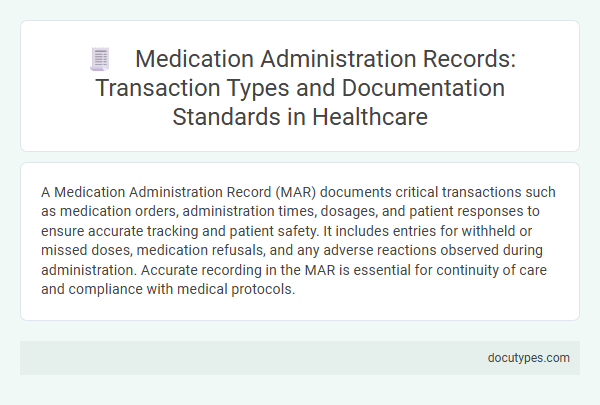A Medication Administration Record (MAR) documents critical transactions such as medication orders, administration times, dosages, and patient responses to ensure accurate tracking and patient safety. It includes entries for withheld or missed doses, medication refusals, and any adverse reactions observed during administration. Accurate recording in the MAR is essential for continuity of care and compliance with medical protocols.
Introduction to Medication Administration Records (MAR)
A Medication Administration Record (MAR) is a critical document used in healthcare to track the administration of medications to patients. It ensures accurate and timely delivery of prescribed drugs, enhancing patient safety and care quality.
MAR records transactions such as medication name, dosage, route, and time of administration. It also logs the identity of the healthcare professional administering the medication and any missed or refused doses. Your attention to these details helps maintain compliance and prevents medication errors.
Key Transaction Types in Medication Documentation
What types of transactions are recorded in a Medication Administration Record? Key transaction types in medication documentation include medication administration, dispensing, and communication of drug allergies or adverse reactions. Your accurate recording of these transactions ensures safe and effective patient care.
Standardized Documentation Protocols
| Transaction Type | Description | Standardized Documentation Protocols |
|---|---|---|
| Medication Orders | Entries that specify prescribed medications, dosages, routes, and schedules. | Use of uniform order forms or electronic order entry systems ensures accuracy and clarity. |
| Administration Records | Documentation of the exact time, dose, route, and administrator of each medication given. | Standardized time-stamping and signature protocols are vital for verification and accountability. |
| Medication Refusals | Records indicating when a patient declines a prescribed medication. | Consistent codes or notes must be used to document refusals to maintain clear communication. |
| Omissions and Delays | Details of any missed or late medication administrations, including reasons. | Structured fields ensure proper reporting and facilitate risk management. |
| Allergy and Adverse Reaction Notes | Entries describing known allergies or any adverse reactions from administered drugs. | Standardized alert formats enhance patient safety by ensuring immediate recognition. |
| Verifications and Authorizations | Records confirming medication reconciliation and approval by licensed practitioners. | Use of electronic signatures and audit trails adheres to healthcare regulatory standards. |
Adhering to these standardized documentation protocols in your Medication Administration Record ensures accuracy, enhances patient safety, and supports effective communication among healthcare providers.
Regulatory Guidelines Governing MARs
Medication Administration Records (MARs) document all transactions related to medication delivery, including administration times, dosages, and patient responses. Regulatory guidelines mandate precise recording of each medication event to ensure patient safety, compliance with healthcare standards, and accurate treatment tracking. Agencies such as the Joint Commission and FDA require MARs to maintain clear, timely, and legible entries to support audits and prevent medication errors.
Electronic vs. Paper-Based MARs
Medication Administration Records (MARs) document all transactions related to patient medication management. Your records can be maintained through electronic or paper-based systems, each handling transaction types differently.
- Medication Orders - Electronic MARs capture digital physician orders instantly, while paper MARs require manual transcription.
- Dose Administration - Electronic systems log the exact dose and time with automated alerts; paper MARs depend on handwritten entries by healthcare staff.
- Medication Changes - Electronic MARs track modifications and cancellations with timestamps; paper versions may have delay or errors in updating.
Essential Data Elements in MAR Entries
The Medication Administration Record (MAR) documents critical transactions related to medication delivery within a healthcare setting. It records when, how, and by whom medications are administered to ensure patient safety and treatment accuracy.
Essential data elements in MAR entries include patient identification, medication name, dose, route, and time of administration. Your MAR also captures the prescribing physician, any special instructions, and the signature of the healthcare professional who administered the medication.
Common Errors in Medication Record-Keeping
A Medication Administration Record (MAR) documents all transactions related to the dispensing and administration of medications, including dosage, time, route, and the administering healthcare professional's details. Common errors in medication record-keeping involve omitted documentation, incorrect dosage entries, and failure to update allergy or interaction information. You must ensure accurate and timely updates to avoid adverse patient outcomes and maintain compliance with healthcare standards.
Best Practices for Accurate Medication Documentation
Medication Administration Records (MAR) document all transactions related to the prescribing, dispensing, and administration of medications to patients. These records include details such as medication name, dosage, route, time, and the identity of the healthcare professional administering the drug.
Best practices for accurate medication documentation involve timely and precise recording immediately after administration to prevent errors. Ensuring legible entries and using standardized abbreviations promote clarity and support patient safety in clinical settings.
Role of Interdisciplinary Teams in MAR Management
The Medication Administration Record (MAR) tracks all medication-related transactions to ensure patient safety and accurate treatment. Interdisciplinary teams play a crucial role in managing these records to maintain consistency and accountability.
- Medication Orders - Physicians and pharmacists input and verify prescriptions to ensure correct medication details.
- Administration Documentation - Nurses record the time, dosage, and route of medication administration for each patient.
- Monitoring and Adjustments - Healthcare providers collaborate to note any changes in medication plans based on patient response and clinical assessments.
Your participation in this team ensures accurate and effective medication management within the MAR system.
What Types of Transactions Are Recorded in a Medication Administration Record? Infographic

